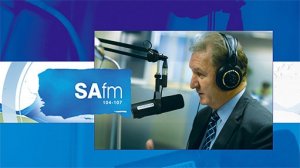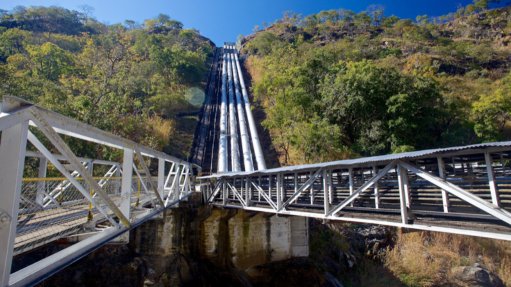On-The-Air (15/02/2019)
Every Friday, SAfm’s radio anchor Stephen Kirker speaks to Martin Creamer, publishing editor of Engineering News and Mining Weekly. Reported here is this Friday’s At the Coalface transcript:
Kirker: African countries are streaking ahead of South Africa on the mining automation front. A lot of mines are very marginal in this country, it would take a lot to recapitalise them. What is preventing people from automating in South Africa? Is it the sentiment or the cost? What is the issues?
Creamer: I think that they didn’t realise that it can be job centred as well as automating and it can create wealth that benefits everybody. I think that there is a bit of a short sightedness on that. In the meantime, you have got a new gold mine, Kibali gold mine in a place like the Democratic Republic of Congo. You would think that that would be backward.
This is the most foremost mine now in the world. It is now part of the Barrick group and you have a situation where it has got mission control systems that manage the transport of the ore without any human intervention at all. Now, the person who has masterminded all this, we have also lost him, he used to be around in Selby at the Rand Mines are in the mid-nineties, but he is now heading the world’s biggest gold mining company, Barrick.
His name is Dr Mark Bristow and he has got his foot on the accelerator when it comes to automation. He is creating a lot of wealth that is benefitting a lot of countries and there is no short sightedness about this. What we are now in, is we are losing out on modernisation. We have tried to retrieve ourselves, we have got the Mandela Mining Precinct at Carlow Road in Johannesburg. They are trying to play catch up now, but unfortunately all we are seeing is a shrinking of particularly our gold mines and there is just nothing being done about that to stop that shrinkage.
Kirkby: Another problem facing our mines is the supply of power, power is essential to these mining operations. The amount of power which is used in keeping them ventilated, the lights on and the winding engines going. Anyone who has been part of a mine knows that there is a huge big substation outside most mines. They need a lot of power. They can’t rely on Eskom at the moment, but I understand I was reading about a company out in Mpumalanga which is growing, because it offers solar solutions.
Creamer: Mining companies are opting for solar power, because it is cheaper than Eskom power. It is also better in a lot of places in Africa. We have just got Harmony Gold presenting their results this week and they revealed that in the Free State they are procuring on a 30 MW solar power plant, which will out do Eskom. They are going to use that power to power their Phakisa mine, which is a deep mine.
Electricity is electricity, whether it comes from the sun or coal it still moves your plant. If it does that cheaper than it is the way to go. It is pity that Eskom is losing market share, because of their very high tariffs. We see at Loulo in Mali they have moved to solar power. I am looking at a map now and you can see Botswana moving to solar power, East African and West African mining moving to solar power. It is cheaper.
Kirkby: Only black-owned companies will be allowed to buy the seven mining operations that are up for sale in Mpumalanga. White-owned companies are excluded.
Creamer: It is black-owned companies only. White-owned companies are excluded totally. This is a decision of the Australian owner South32, which has got four coal mines there, three coal processing plants, including a big life extension project. They say that they want to be part of South Africa’s transformation process. What they are doing now is they have taken a lot of bids in and looking at those bid.
By the 30th of June they will select the preferred bidders and these bidding companies must be black-owned and they must be black-operated. Already, WorleyParsons, one of the consultancy firms from Australia, has been working on developing black companies and black human resource so that they can come in and take over these mines, because it is a reputational issue for South32. They are listing in London and Australia and Joburg. They don’t want this to crash when they leave it, they want sustainability and it must be done by black ownership and black operation, with no white-ownership included
Kirkby: Thanks very much. Martin Creamer is publishing editor of Engineering News and Mining Weekly.
Article Enquiry
Email Article
Save Article
Feedback
To advertise email advertising@creamermedia.co.za or click here
Press Office
Announcements
What's On
Subscribe to improve your user experience...
Option 1 (equivalent of R125 a month):
Receive a weekly copy of Creamer Media's Engineering News & Mining Weekly magazine
(print copy for those in South Africa and e-magazine for those outside of South Africa)
Receive daily email newsletters
Access to full search results
Access archive of magazine back copies
Access to Projects in Progress
Access to ONE Research Report of your choice in PDF format
Option 2 (equivalent of R375 a month):
All benefits from Option 1
PLUS
Access to Creamer Media's Research Channel Africa for ALL Research Reports, in PDF format, on various industrial and mining sectors
including Electricity; Water; Energy Transition; Hydrogen; Roads, Rail and Ports; Coal; Gold; Platinum; Battery Metals; etc.
Already a subscriber?
Forgotten your password?
Receive weekly copy of Creamer Media's Engineering News & Mining Weekly magazine (print copy for those in South Africa and e-magazine for those outside of South Africa)
➕
Recieve daily email newsletters
➕
Access to full search results
➕
Access archive of magazine back copies
➕
Access to Projects in Progress
➕
Access to ONE Research Report of your choice in PDF format
RESEARCH CHANNEL AFRICA
R4500 (equivalent of R375 a month)
SUBSCRIBEAll benefits from Option 1
➕
Access to Creamer Media's Research Channel Africa for ALL Research Reports on various industrial and mining sectors, in PDF format, including on:
Electricity
➕
Water
➕
Energy Transition
➕
Hydrogen
➕
Roads, Rail and Ports
➕
Coal
➕
Gold
➕
Platinum
➕
Battery Metals
➕
etc.
Receive all benefits from Option 1 or Option 2 delivered to numerous people at your company
➕
Multiple User names and Passwords for simultaneous log-ins
➕
Intranet integration access to all in your organisation



















